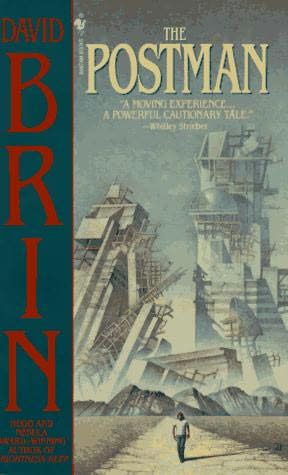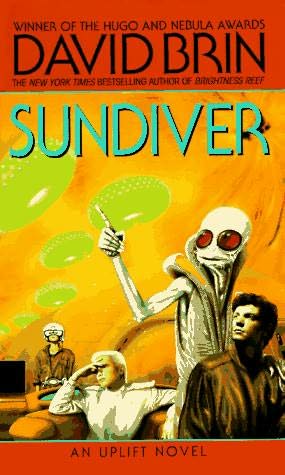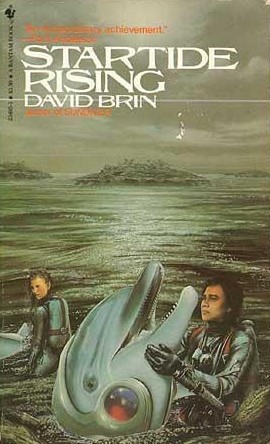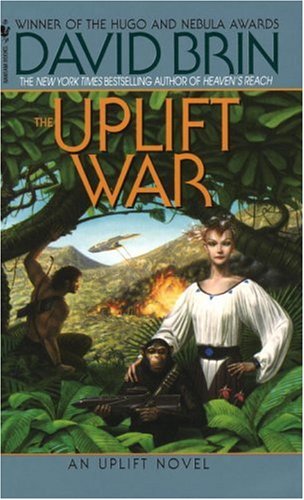David Brin’s Nonfiction
While most famous for his Science Fiction works, it is actually Dr. Brin’s non-fiction that I find most inspiring. The Doctor is a brilliant man with fascinating perspectives on society, politics, and technology. He is a role model of pragmatic centrism.
Brin takes a phenomenally unique perspective on the growth of surveillance equipment across our communities in his essay Three Cheers for Surveillance Society! Here he offers a counterpoint to “Big Brother” fears so often raised when speculating about the possibilities of this technology, and argues that surveillance equipment, if shared with the community, can provide a watchdog for all citizens. If the cameras were pointed at everyone, including our government officials, then accountability would reign.
In his essay Disputation Arenas, Dr. Brin explores the internet’s potential to provide society with a decentralized decision structure that relies on emergent behaviors. He also defines a structured debate format whereby extensive and thorough exploration of a single issue may be conducted as opposed to the quick trading of sound bytes our media provide today. The concept of these Debate Arenas is so easy to implement and holds so much potential for approaching ideal means on so many issues.
Such simple, pragmatic solutions to so many of the perceived problems we have with modern politics are a trademark of Brin’s writing. Rather than proposing broad, sweeping changes to the American system of governance that would be Herculean undertakings, Brin suggests baby steps that can effect good results in the near-term. Brin focuses on things people may accomplish in their local communities, behaviors candidates may emulate to promote honorable discourse, and ways to alleviate resentment by the losing minority in American elections.
Brin has also written many terrific essays critical of some of our most cherished works of fantasy and science fiction. He trashed Lord of the Rings, Star Wars, and The Matrix as being anti-democracy and anti-meritocracy. While these essays are entertaining, they also successfully illustrate some serious problems with mainstream fiction that spread romantic ideals contraindicated to our modern ideals.
I do not endorse Dr. Brin necessarily because I agree with him, but because he provides new ways of looking at common subjects. He is a positive writer, a centrist, and, most of all, very hopeful about our world and its future. Dr. Brin is easily the greatest influence on my own style of writing as far as this blog is concerned.
And it’s all available online:
NOTE: Some readers will find Dr. Brin’s latest essays unsettlingly partisan, and I myself have found some of his harsh responses to reader’s criticisms disheartening. I am hoping this slightly reactionary tone is only temporary, but David Brin’s long record of centrism and reasonable discourse does earn him the right to become passionate.
The Postman
 The Postman |
“Neither snow nor rain nor heat nor gloom of night stays these couriers from the swift completion of their appointed rounds.”
– Herodotus, Inscription, New York City Post Office, adapted from Herodotus
Greek historian & traveler (484 BC – 430 BC)
A complex chain of events has led to the post-apocalyptic future Gordon finds himself wandering in, moving from town to town as a performer, accepting hot meals and a place to sleep in exchange for the, by our standards, amateurish entertainment he provides. We meet him having just been robbed of all his possessions by bandits and expecting to die when the night cold settles down, but fate brings him to the weathered corpse of a mail carrier. The uniform saves his life and the old lost letters provide him interesting reading.
A strange thing happens then, as the towns he visits believe he actually is a postman, reminding them of their lost civilization and better times. They give him letters to carry on to the next town, opening lines of communication between communities that have been isolated for more than a decade. Everywhere the Postman goes, he spreads a hope in the rebirth of civilization.
Unlike most post-apocalyptic fantasies, which deal purely with degenerated humans struggling to survive, Brin’s story takes place after the conflict, when all the canned foods have been scavenged and life has settled down into a much more mundane survival routine, foraging and hunting. Dr. Brin focuses on a phase no other author or moviemaker has had the skill to confront: the reconstruction.
While other apocalyptic-times-genre tales try to make us yearn for the pre-apocalyptic, our own, times, they fail because we live in their “golden” times and find their survivalist-dominated fictional realm far more exciting in it baseness. Dr. Brin focuses so much on what is lost in the collapse of a civilization that no naive, romantic idealism of what life without our modern cooperative conveniences is left in the reader’s mind. There is cold at night, no books or television, only working to survive, always working, hunting, and sowing and reaping the land in an endless miserable struggle between hunger and death.
Against such a bleak backdrop the concept of the Postman, a thing we take for granted as commonplace in modern society, becomes a credible and inspiring icon of civilization. History becomes mythology around this ideal, like the fact that Mail Carriers were allowed to move freely across borders during the American Civil War and then there is the most famous Postmaster of all, Benjamin Franklin. The Postal Service is a public service that ties all of America together with lines of communication. Without it, we would have no country. How could we, when without it our locality becomes our entire world?
There are villains lying in wait to fight progress in the novel, and these are the survivalists. They are like bandits plundering towns, taking the fruits of their labor. They are hierarchical, elitist, and prefer to shun civilization as a weak communal enterprise.
They prefer to bring down the emerging collective power of the many towns and villages that threaten their lawless way of life, but above the war between human beings, there is a greater war taking place over an ideal. The civilized people are willing to fight for a thing that does not exist, but something the Postman has planted in their minds and they are slowly becoming themselves, a “Restored United States.”
It is this profound understanding of American principles that makes Dr. David Brin’s The Postman one of the most patriotic books ever written.
NOTE: Kevin Costner adapted this novel into a film of the same title in 1997, which became one of that decade’s most notorious flops. The film follows the novel slightly, and I was able to see it in a better light having read the book first, but the movie resorts to many formulaic cliche’s at the expense of the book’s ideals, and fails to inspire as a result. I do not recommend seeing the movie, unless you are curious after reading the book.
The Uplift Trilogy
 Sundiver |
It takes an extremely gifted author to construct an entirely fictional world from scratch. From J.R.R. Tolkien’s Lord of the Rings trilogy, to J.K. Rowlings’ world of Harry Potter, to the fantasies of Star Trek, races, characters, politics, environment and a multitude of other factors must not only be invented out of imagination, but remain consistent throughout the story as well.
Dr. David Brin’s first Uplift Trilogy is the favorite world in which my mind’s eye likes to play. In it he has constructed a myriad of civilizations and alien races, with a complex network of intergalactic relationships and organizations to govern them. These are the Five Galaxies.
You can read the first Uplift Trilogy in any order. I began with The Uplift War, the third book, proceeded to SunDiver, the first, and then Startide Rising. Each book is an enclosed story unto itself, with minor tangential references to the other two. Reading them all creates a complete and complex portrait of the Uplift universe.
Stories, even Science Fiction, must speak to the actual human condition to achieve greatness, and the Uplift Universe works well as a mirror of human interactions on Earth. Rather than a biosphere packed full of different cultures and ethnic groups, we have five galaxies brimming with alien civilizations. Like nations on Earth, they wage war, forge alliances, ratify treaties, and otherwise haggle over their common shared existence.
 Startide Rising |
Like our own, the Five Galaxies’ systems of Governance are imperfect. Like Democracy, the system merely provides guidelines, with only a popular agreement to conform to them and no other way to enforce them. Civil rights are not universal, stronger civilizations invade and exploit the weaker, Uplift ethics are abused, but the system tempers all of these things and the characters find ways to triumph.
Within the individual civilizations, Dr. Brin introduces the concept of “Uplift” a process where patron races actively evolve lesser species into sentience. This is reminiscent of scientists teaching chimpanzees sign language, or developed nations providing assistance to the third-world. Human beings in the Five Galaxies have turned Chimpanzees and Dolphins into space-explorers; complete with the idiosyncrasies these species exhibit in nature today.
The spirit of exploration is alive and well in these books; despite the fact that not one of them follows its characters beyond the vicinity of the planet we encounter them. Sundiver takes place entirely in our own solar system, but fascinates us with discoveries the characters make right in our own backyard. Startied Rising explores the complexity of a single planet and its mysterious history while an intergalactic war rages in the space surrounding it. The spirit of discovery in each book is purely scientific rather than geographical. Ideas are explored while the fantastic scenery is taken for granted.
 The Uplift War |
While the scope of each book is enormous in what it encompasses spatially, socially, and scientifically, we are always aware that we are only glimpsing a microcosm of the whole picture. Possibly the most intriguing aspect of these books is how they manage to leave the reader very satisfied at the end of each installment and yet leave so many things unresolved. Each loose string is like a path of speculation for readers to follow according to their own imagination. Perhaps that is what makes Dr. Brin’s Uplift Universe so real, it’s vastness and all of the mysteries it leaves unanswered.
NOTE: David Brin has also written a second Uplift trilogy, which I have not yet read. Hopefully it will live up to the status his classic first trilogy has attained.
Comments
One response to “Recommended Reading: David Brin”